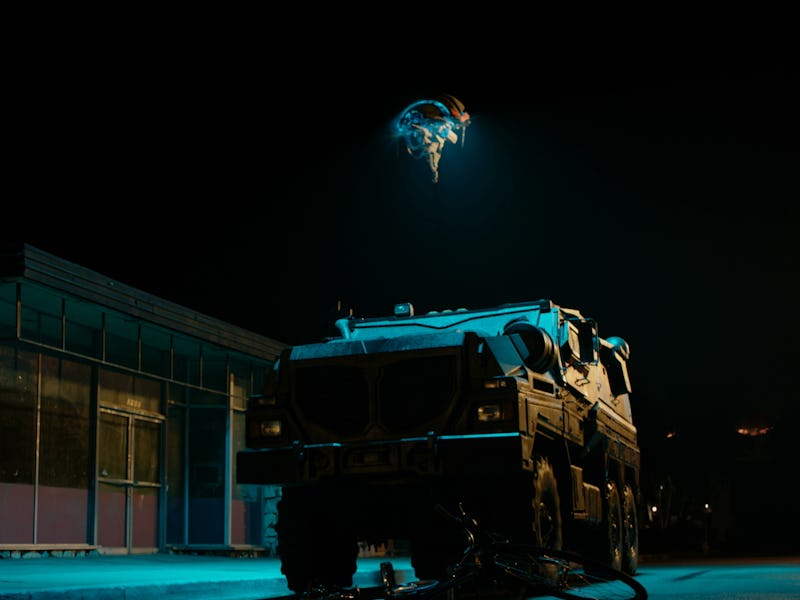Is USA's 'Colony' Worth Your Time? Not if You Haven't Seen 'The Expanse'
Producer Carlton Cuse's dystopian pilot for USA asks big, silly, and ultimately rhetorical questions.

There’s been so much dystopian sci-fi television cropping up recently that it’s increasingly difficult to see straight when watching any given show. There are the recent forays of the ambitious, revamped Syfy channel — Childhood’s End to The Expanse — Amazon’s The Man in the High Castle, and FOX’s failed Minority Report. USA’s Mr. Robot speaks to some of the same concerns in a more self-consciously cerebral, turn-of-the-millennium think-thriller way. Anyone who has sped through the (now complete) archives of the British, Charlie Brooker-helmed series Black Mirror is, to various extents, always walking around in some sort of psychosis, imagining what dangerous technological seeds we might be planting for an uncertain future. Even MTV’s new Jon Favreau-produced adaptation of Terry Brooks’ popular fantasy books from late ‘70s/early ‘80s fantasy series The Shannara Chronicles imagines the future of Earth in debris, albeit with magic in the air.
But how many original possibilities are there for near-apocalypses to come? When we speculate, how much do we tread on other series, and create strange moments of déjà vu? With USA getting some attention as a possible new site of prestige TV buzz (like every channel and platform, it seems), the channel’s newest series — from Lost, Bates Motel, and The Strain co-producer Carlton Cuse — seems to be aiming to be the Breaking Bad to Mr. Robot’s Mad Men. But first indications make this possible future seem more than uncertain. The pilot for the show is available now at USANetwork.com, and premieres on cable this Thursday night.
While watching Colony, you’ll see blurred, reflective images of Man in the High Castle and Childhood’s End superimposed. Like the Amazon show, the world of Colony looks normal — even idyllic — at first glance, but there are all sorts of inhumane dampers on security and privacy. The geography of the county is completely alternative, divided into areas called “blocs” that citizens go to great length to sneak between, and the world is one big military state. There’s an underground trade-based black market, a curfew of 10 o’clock for all residents, and they disperse families as they want to. The central nuclear unit the show focuses on is that of Los Angeles-based Will (Lost’s own Josh Holloway) and Katie Bowman (The Walking Dead’s Sarah Wayne Callies), one of whose sons could have been cut off from them. In Will’s attempt to reconnect with him by sneaking into the Santa Monica bloc, he’s taken in by the government.
Sarah Wayne Callies as Katie in 'Colony'
It’s only as things progress that we see green lights in the sky, and understand that the brutal directives are coming from an alien race, as yet unveiled. Will is blackmailed by corrupt Governor Alan Snyder (Peter Jacobson) into complying with the “Collaborators” — the government officials who keep the “peace” by adhering to the “Hosts’” requests. Will is to work hunting down members of the “Resistance” against authoritarian rule, applying the skills he used prior to the alien takeover as a U.S. Army Ranger and FBI Special Agent, to insure his children’s future.
You see where the “Childhood’s End” parallels come in here. Using the same B-budget computer animation that Syfy original programming favors, we see the troubled dark clouds in the sky, indicating that we are not alone. There’s a decided familiar banality to all of this, and though the unveil of the workings of the society is messy and gradual — so that the show keeps the viewer locked in — the acting is stilted. The lines seemingly recycled from almost any hard-boiled, stylized drama, and often, motivations are unclear. Most glaringly, why would Will choose to smuggle himself into Santa Monica without so much as warning his family, or setting up some sort of alibi for himself? What wedge is preventing Will and Katie from being honest with each other, and do they only relate to each other with sudden, performative torrents of violently passionate sex?
Also, one wonders: Are there any serious political overtones intended here, or is the Colony universe just an on-the-surface, garbled mish-mash of tropes from other sources? Why “Redhats” (patrolling government soldiers) and “blocs”? We’ve got glorified “drones” and plenty of WWII and Cold War imagery. Something or nothing? Is this worth reading into?
The final twist of the episode — which revolves around some secret allegiances of Katie’s — is predictable from the pilot’s first half. Like a kitsched-up version of the The Leftovers, we are supposed to accept and respond emotionally to the way these flawed characters are dealing with losses that they could not control and which they still don’t know how to come to terms with. But with the show’s pilot offering so little that’s new in either its stylistic details or macro conceit, it seems unlikely that we’ll ever grow to feel this, unless the show takes a chance and goes wildly off the rails. But it doesn’t seem like it’s been cast properly, or directed that way. In this way, it’s similar to Man in the High Castle especially, an enjoyable concept in search of a compelling, self-critical realization.
The border between the L.A. and Santa Monica 'blocs'
Nothing in Colony’s exposition plays against expectations. But if dystopian sci-fi of this general phylum is your bread and butter — what you watch the way your grandparents watch Wheel of Fortune — then Colony will certainly scratch an itch. But carry USA into a new age of considered, idiosyncratic original programming it will not.